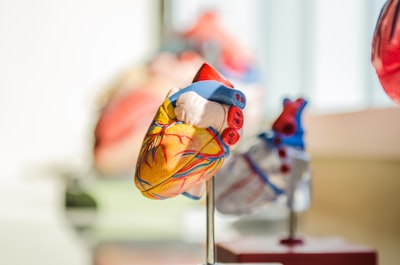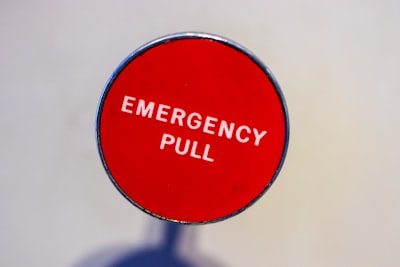What are the Cardiac Effects of Dehydration in a Nutshell?
If you're a pro athlete or simply an outdoor enthusiast who's not afraid of getting a little thirsty, you might be wondering... what are the cardiac effects of dehydration? Hey there, heart warriors! Did you know that dehydration can have a major impact on your ticker? It's true! When we're not getting enough fluids, it can cause our blood pressure to drop and our heart to work harder than it should. And that's not all - dehydration can even lead to heart palpitations! But don't worry, we've got you covered with all the tips and tricks you need to keep your heart healthy and hydrated. In this post, we'll cover everything from the initial symptoms of dehydration to the long-term impact on your recovery. We'll even share some fun and easy ways to stay hydrated throughout the day, including getting the right IV drink to go in your purse or pocket! So grab a glass of water and let's dive in!
Understanding Dehydration
Dehydration occurs when your body loses more fluids than it takes in. Increased thirst and decreased urine output are common symptoms of dehydration. It's important to note that dehydration can actually have an impact on your heart rate and blood pressure. Proper hydration, therefore, plays a crucial role in maintaining a healthy cardiovascular system. Remember to drink plenty of water, especially during intense exercise or in the summer heat, and avoid caffeine or sports drinks which can lead to fluid restriction. Stay hydrated and keep your heart happy!
Initial Symptoms of Dehydration
Feeling parched and tired? Those could be the initial symptoms of dehydration sneaking up on you. When your body lacks fluids, it often manifests through a dry mouth and fatigue. Don't ignore dizziness and lightheadedness, they could be subtle warnings of dehydration too. Thirst is your body's way of asking for more fluids, so listen up! Keep an eye on your urine color too; dark yellow urine may indicate dehydration. And heads up, even mild dehydration can bring on headaches and make it hard to focus. Stay hydrated, folks!
Hydro-Stats! Some Fun Facts About Hydration
- Being about 60% water itself, your body largely relies on water to function properly.
- Nearly half of people who experience a sudden cardiac arrest experience a warning sign 24 hours before the attack.
- Aim to drink one and a half times the fluid you lost while exercising, spread out over the following several hours.
The Cardiac Connection: How Dehydration Affects the Heart
The heart and hydration share a close relationship, and understanding how dehydration affects the heart is crucial. When dehydrated, the heart rate can increase, putting additional strain on this vital organ. Low fluid intake leads to a decrease in blood volume, hindering the heart's ability to pump effectively. Severe dehydration can even cause heart palpitations and irregular heart rhythms. Additionally, dehydration can contribute to higher blood pressure levels as the heart compensates for the reduced blood volume. Being aware of these cardiac effects emphasizes the importance of staying hydrated, especially during hot summer months or intense exercise. So, remember to drink plenty of fluids and consider sports drinks when necessary.
Could Dehydration Cause Low Blood Pressure?
Dehydration can potentially lead to low blood pressure, particularly when combined with heat exposure or intense physical activity. The decrease in blood volume due to dehydration reduces the amount of blood circulating through the blood vessels, which may result in symptoms like lightheadedness and fainting. Addressing dehydration promptly is important to prevent complications associated with low blood pressure. Replenishing fluids helps restore blood volume and normalize blood pressure levels.
Can Dehydration Trigger Heart Palpitations?
Dehydration can potentially trigger heart palpitations. When the body is dehydrated, it releases stress hormones that can increase heart rate and lead to palpitations. Electrolyte imbalances caused by dehydration may also impact the heart's electrical system, resulting in irregular rhythms. Proper hydration is crucial for preventing or reducing the frequency of heart palpitations.
Dehydration can have negative effects on the heart and lead to various heart conditions. When the body is dehydrated, it can cause a decrease in blood volume which makes the heart work harder to circulate blood throughout the body. Dehydration can also lead to an increase in heart rate and blood pressure which can be dangerous for people with existing heart conditions. It is important to stay hydrated and drink enough water to prevent these potential cardiac effects of dehydration.
The Long-Term Impact: Recovery from Dehydration
The recovery time from dehydration depends on its severity and individual factors. For milder cases, drinking fluids and resting can often resolve the issue. However, severe dehydration may require medical intervention and rehydration therapy. It is important to gradually restore hydration levels to prevent complications. Adequate hydration is crucial for maintaining overall health and preventing long-term effects. So, remember to drink plenty of fluids and take care of your hydration levels, especially during intense exercise or in the summer heat.
The Recovery Timeframe: How Long Does it Take?
The recovery timeframe for dehydration varies based on the individual and severity. Mild dehydration can resolve in a few hours to a day with rehydration. Severe cases may require days of fluid replacement and medical monitoring. Hydration should continue even after symptoms subside, following healthcare provider's guidance.
Is Dehydration an Emergency?
Signs of severe dehydration, like confusion, rapid heartbeat, and decreased urine output, can indicate a medical emergency. If you experience these symptoms, seek immediate medical help to prevent life-threatening complications. Certain individuals, such as those with chronic illnesses, may be more susceptible to dehydration emergencies.
Recognizing Severe Dehydration: When to Seek Medical Help
Feeling like you can't keep fluids down due to a pesky stomach bug? Vomiting and diarrhea can lead to severe dehydration. Extreme thirst, minimal urination, and dizziness are signs that your body needs attention. Keep an eye out for rapid breathing, sunken eyes, or lethargy, which can indicate severe dehydration. If you have pre-existing conditions like kidney disease or heart failure, be extra cautious. Don't hesitate to contact a healthcare professional if you're concerned. Stay hydrated, folks!
Preventive Measures: How to Avoid Dehydration
Stay cool and hydrated with these fun tips! Whether you're basking in summer heat or engaging in intense exercise, it's important to keep your body hydrated. Drink plenty of water throughout the day and be mindful of your fluid intake, especially during hot weather or vigorous physical activity. Avoid excessive alcohol consumption, as it can contribute to dehydration. Add hydrating foods like fruits and vegetables to your diet. Consider reaching for electrolyte-rich sports drinks to replenish fluids during periods of intense sweating or prolonged activity. Stay hydrated and beat the heat!
Hydrating Habits: Simple Tips to Stay Hydrated
Hydrating can be easy and fun with these simple tips. Don't just rely on water; consider incorporating sports drinks into your routine for an extra hydration boost. Pay attention to your urination frequency and color - if you're not going often or your urine is dark, you may not be drinking enough. Beat the summer heat and intense exercise by sipping on fluids regularly. Avoid fluid restriction and stay hydrated to prevent heat exhaustion. Cheers to a healthy heart!
On the other hand, in rare cases, overhydration, or drinking too much water, can also sometimes be a concern. Severe dehydration can cause symptoms such as dark yellow or amber-colored urine, rapid heartbeat and breathing, and lightheadedness. Additionally, dehydration can cause the blood to retain more sodium which makes it harder for it to circulate through the body. It is important to drink enough water to stay hydrated but the amount needed depends on individual needs.
What Can Cause Heart Palpitations Other than Dehydration?
Heart palpitations can be caused by factors other than dehydration, including:
- Stress
- Anxiety
- Caffeine intake
- Certain medical conditions like hyperthyroidism and arrhythmia
- Medications such as decongestants and inhalers
These and many more can all potentially contribute to heart palpitations. It's important to consult with a healthcare professional if you experience frequent or severe palpitations.
Are There Other Signs of Dehydration (Besides Thirst) to Watch For?
Other signs of dehydration to watch for include dark yellow urine, dry mouth and throat, fatigue, dizziness or lightheadedness, headache, muscle cramps, rapid heartbeat, and sunken eyes. Stay hydrated by drinking plenty of water throughout the day and seek medical attention if experiencing symptoms.
Dehydration can have serious cardiac effects, especially in the context of heat exhaustion. When the body loses too much water, the blood volume decreases, making it more difficult for the heart to pump blood and oxygen to the organs. This can lead to an increased heart rate, low blood pressure, and even cardiac arrest in severe cases. It's important to stay hydrated and seek medical attention if experiencing symptoms of heat exhaustion such as confusion, dizziness, and fatigue.
Frequently Asked Questions
Is there anything you can do to prevent future dehydration and related heart palpitations?
Preventing dehydration and related heart palpitations is possible with simple steps. Stay hydrated by drinking plenty of water and avoid sugary or caffeinated beverages. Include foods with high water content in your diet. Avoid excessive physical activity without proper hydration and exposure to hot temperatures. Consult a healthcare professional for frequent dehydration or heart palpitations.
How does dehydration affect blood flow and blood pressure, and what impact does this have on the heart?
Dehydration can lead to decreased blood volume, causing reduced blood flow and an increased heart rate. As a result, blood pressure may rise, putting strain on the heart. Long-term dehydration can contribute to cardiovascular issues. Staying hydrated is crucial for maintaining a healthy heart and preventing cardiac problems.
What are the short-term and long-term effects of dehydration on cardiovascular health?
Short-term effects of dehydration on cardiovascular health include an increased heart rate and decreased blood pressure. In the long term, dehydration can lead to chronic conditions like hypertension and even heart disease. It can also increase the risk of blood clots and stroke. Staying hydrated with water and electrolytes is crucial for maintaining good cardiovascular health.
Are there any particular populations that are at higher risk for cardiac effects of dehydration?
Certain populations, such as older adults, athletes, individuals with chronic health conditions, and those taking certain medications, are at higher risk for the cardiac effects of dehydration. Monitoring hydration levels and seeking medical attention if experiencing symptoms is crucial for these individuals.
Can dehydration lead to heart attacks or other serious cardiac events?
Dehydration can have serious cardiac effects. It can lead to a decrease in blood volume, causing an increase in heart rate and a decrease in cardiac output. Chronic dehydration may contribute to the development of cardiovascular disease, including hypertension and stroke. Staying hydrated is crucial for maintaining a healthy heart and preventing serious cardiac events.
How does dehydration affect cardiac output?
Dehydration can have significant effects on cardiac output. It decreases blood volume, which in turn increases heart rate, leading to a decrease in cardiac output. The heart has to work harder to maintain blood pressure and circulation when dehydrated. Additionally, severe dehydration can disrupt electrolyte balance, affecting the heart's electrical conduction system. Staying hydrated is essential for optimal cardiac function.
Conclusion
So, remember to stay hydrated and take care of your heart! Dehydration can have serious effects on the cardiovascular system, so it's important to recognize the initial symptoms and take preventive measures. But don't worry, recovery from dehydration is possible with the right steps and time. If you experience severe dehydration or persistent heart palpitations, it's always best to seek medical help. And while we're on the topic of heart health, it's good to know that other factors can cause heart palpitations as well. So, let's keep our hearts happy and healthy by staying hydrated and taking care of ourselves. Cheers to good heart health!
DISCLAIMER: THIS WEBSITE DOES NOT PROVIDE MEDICAL/HEALTH ADVICE
The information, including but not limited to, text, graphics, images and other material contained on this website are for informational purposes only. No material on this site is intended to be a substitute for professional medical advice, diagnosis or treatment. Always seek the advice of your physician or other qualified health care provider with any questions you may have regarding a medical condition or treatment and before undertaking a new health care regimen, and never disregard professional medical advice or delay in seeking it because of something you have read on this website.







